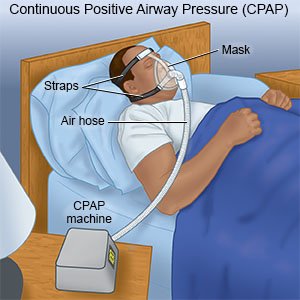CPAP
Medically reviewed by Drugs.com. Last updated on Sep 23, 2025.
AMBULATORY CARE:
CPAP (continuous positive airway pressure)
is a treatment that uses air pressure to keep your airways open while you sleep. CPAP is used to treat obstructive sleep apnea (OSA). A CPAP machine connects the mask to the machine with a hose. Air pressure prevents your airway from collapsing or becoming blocked during sleep. Use your CPAP machine when you sleep, even when you nap. You may need to use a CPAP machine for the rest of your life.
 |
Make CPAP easier to use:
- At first, try to use your CPAP for a few hours every night. Then slowly increase the length of time you use your machine. It takes time to adjust to CPAP treatment.
- You may need to use a special moisturizer made for CPAP users. You may need a mask that is a different size, shape, or material. Talk to your healthcare provider if your mask feels uncomfortable or irritates your skin.
- Use a saline nasal spray at bedtime to help relieve nasal irritation. A chin strap to help keep your mouth closed. A different type of mask can help dry mouth. Some machines come with a heated humidifier to help relieve these symptoms.
- Talk to your healthcare provider if you are having problems adjusting to the air pressure. He or she can tell you how to adjust the air pressure on your CPAP. You may need to start at a lower pressure and slowly increase it over time.
Related medications
Call your doctor if:
- You continue to feel very sleepy during the day, even after you wear your CPAP device as directed.
- Your CPAP is causing a problem, such as a rash, that does not improve.
- You have questions or concerns about your condition, care, or equipment.
Follow up with your doctor as directed:
Tell your healthcare provider if your mask no longer fits properly. Write down your questions so you remember to ask them during your visits.
© Copyright Merative 2025 Information is for End User's use only and may not be sold, redistributed or otherwise used for commercial purposes.
The above information is an educational aid only. It is not intended as medical advice for individual conditions or treatments. Talk to your doctor, nurse or pharmacist before following any medical regimen to see if it is safe and effective for you.
Further information
Always consult your healthcare provider to ensure the information displayed on this page applies to your personal circumstances.
